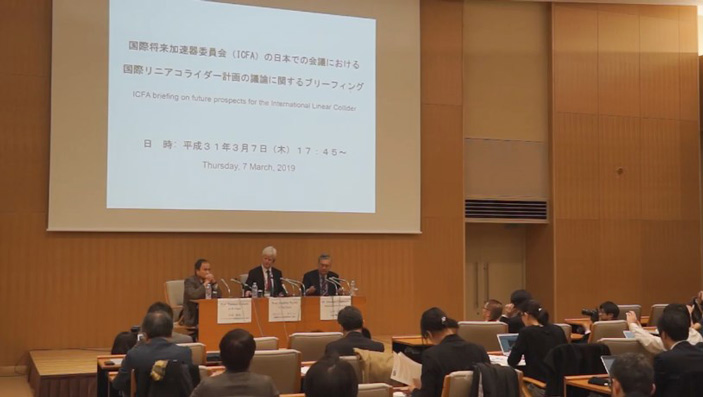A press conference convened in Tokyo on March 7 by the International Committee on Future Accelerators (ICFA) to clarify the situation around the ILC project.
The future of the International Linear Collider ILC, one of the main hopesto a new breakthrough in particle accelerator physics is still foggy. In technical terms, the collider project has long been ready, the technologies have been developed and demonstrated, and the question of starting construction has moved from the scientific and technical plane to the economic one. The main obstacle to the implementation of ILC for several years now remains the uncertain position of the Japanese government, caused by the high cost of the project. On the one hand, Japan understands the importance of ILC both for all particle physics and for the development of science and technology within the country. But the government is not ready to take on all the multibillion-dollar costs of building a collider without guaranteed significant financial contribution from Europe, the United States and other countries. The international community, in turn, strongly expresses its readiness to share difficulties and costs, if Japan starts to implement ILC. However, neither side has yet submitted an official document binding on actions and expenses. Despite years of intensive negotiations, there is still no clear statement from the Government of Japan about its readiness to take on the bulk of the costs.
In 2018, negotiations seemed to be on the home stretch, and the scientific community was awaiting a final decision by mid-December (see the review of the situation in the news on Elementary Particle Physics in 2018 ). However, no clear statement was made by Japan then, although it was once again emphasized that the Japanese government understands the importance of the project and continues to conduct intensive negotiations. It was expected that the decision will be announced on March 7-8, 2019, when the next, 83rd meeting of the International Committee on Future Accelerators ( ICFA ) will be held in Tokyo .
On March 7, as part of the ICFA meeting, a press conference was held on the current situation around the ILC. Initially, Jeffrey Taylor, chairman of the ICFA, made public the message that the Japanese Ministry of Education, Culture, Sports, Science and Technology ( MEXT ) transmitted to the ICFA just a day before. It can be reduced to two points:
1) Japan is interested in the implementation of ILC, but is currently not ready to give the green light for the construction of a collider in a selected location.
2) Japan begins formal negotiations with international partners (countries and laboratories) on the allocation of costs and consideration of alternative locations for the collider.
Then, for an hour, Jeffrey Taylor, as well as Tatsuya Nakada, Chairman of the Linear Collider Board Committee, and Masanori Yamauchi, head of KEK’s largest Japanese laboratory, answered questions from the press and clarified the positions of the parties. So, “not ready” does not mean yet “refuses”; Japan continues to consider all possibilities. Also, for the first time, a clarification “in a chosen place” was made, but this may mean both a preference to build an ILC in another place in Japan and a willingness to invest money only if another country takes over the construction.
It should be clarified that when the ILC construction site was discussed in the early 2010s, there were several proposals (including from Russia), and the Japanese was chosen as the most “safe” in technical, scientific and economic terms. Alternative proposals have not disappeared, they, in principle, can be reanimated. However, over the past time, the general situation in accelerating particle physics has changed. Literally in the last year or two , several projects have gained clear contours at once.electron-positron colliders, capable of working as a Higgs factory and getting about the same scientific results as ILC. Of course, ILC is still the most elaborate project, and if Japan undertakes its construction, ILC will enter service earlier than its competitors. In addition, unlike cyclic accelerators, a linear collider always has the opportunity to increase energy by lengthening the acceleration path. However, ILC has already lost its exclusivity status, and if the question of transferring ILC to another place is raised by the edge, the scientific community can already find a replacement for it. However, a reservation immediately followed that the ICFA would make every effort to implement ILC elsewhere.
As for the ongoing negotiations with international partners, there is also a nuance. So far, all visits and negotiations have been informal. Now Japan has opened the way to official negotiations with the United States, European countries and major international organizations. Details of the planned negotiations are not yet known. In addition, MEXT wants to make sure at the official level that there is complete consensus in the scientific community within Japan regarding the construction of ILC.
Overall, the ICFA and the international community took the message from MEXT with some disappointment. No specific new deadline has been appointed, although the ICFA chairman expressed the hope that Japan will finally be determined within a few months. Japan understands the changed situation in collider physics and the danger that if the decision is delayed for another couple of years, the chances of full support from international partners will decrease.
Further details regarding the press conference and the whole situation can be found, for example, in the LCNewsLine and Iwate & the ILC twitter accounts .

